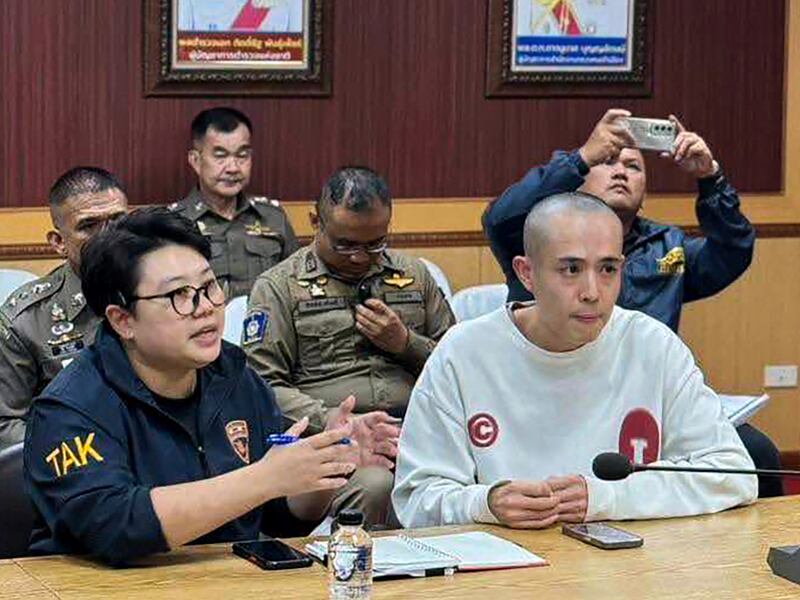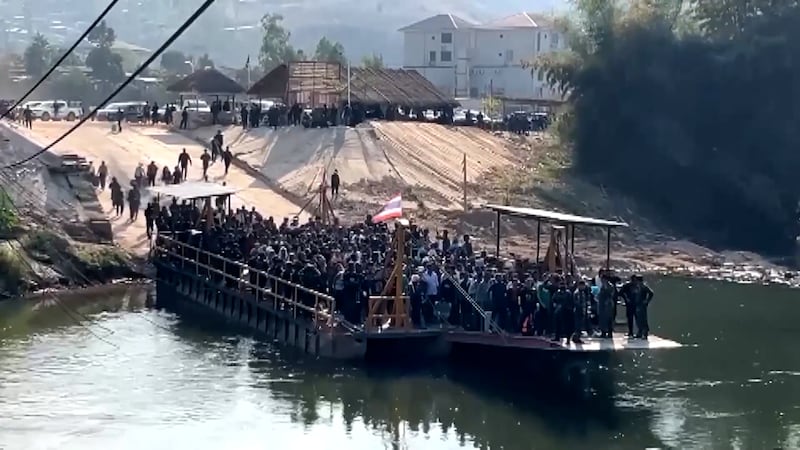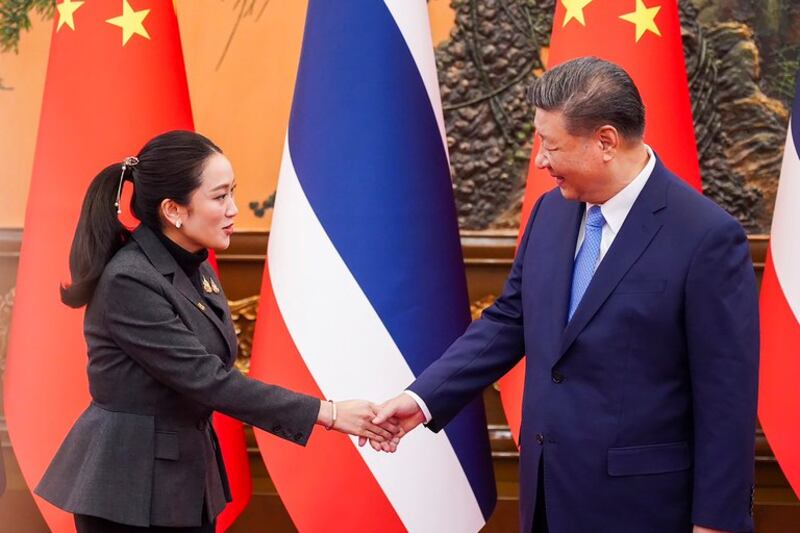Wang Xing, a Chinese actor who had flown to Bangkok for what he thought was a job, was abducted and smuggled into Myanmar last month. A text message to his girlfriend began a social media campaign that led to his release.
What transpired in those days was a concerted Chinese pressure campaign on Thailand. State-controlled media focused on scam centers and the lawlessness of Thailand impacting its lucrative tourism and real estate sectors.
Authorities in Bangkok immediately got the message, and Wang was rescued within four days. It appears Thailand has more influence in the scam centers than it previously let on.
When Prime Minister Paetongtarn Shinawatra traveled to Beijing in early February, she pledged Thai support for eradicating the scam centers, and the Thai foreign ministry said that combating transnational crime was a “national priority.”
For the first time, a Thai leader explicitly identified the scam compounds along its border with Myanmar as a threat to Thailand.
Officials from the Provincial Electrical Authority of Thailand then made a show of cutting off power to KK Park and four other adjacent compounds.
There’s every reason to be cynical about Thai cooperation. It’s nothing we have not heard in the past.
Since taking over almost every border town along the frontier with China, Myanmar’s opposition forces have made a show of shutting down the scam centers and cooperating with Chinese law enforcement.
Hundreds of Chinese nationals were repatriated, including suspected ringleaders wanted by Beijing.
As a result, the influx of scammers to the Thai border region has surged. These compounds, near the primary border crossing of Myawaddy-Mae Sot, are perched on the narrow and shallow Moei River. For years, they ran on Thai electricity and internet.

Thailand briefly shut down power in mid-2023, but did so only after signaling its intentions so the compounds had time to purchase diesel generators. Today, some 20 keep the lights on. The spread of Starlink, has allowed many scam centers to have a backup plan for connectivity.
But the termination of electricity was for show, and short-lived. Shwe Kokko, alone, had an 8,000 KW power deal with Thai suppliers.
Within a week the lights were on again. Simply put, too many Thais, including government officials and security force personnel, were profiting.
Even if the electricity and network are cut off, the concrete and construction materials for the proliferating centers all come from Thailand, as does the food, the computer terminals, and other equipment.
Thailand now appears to be operating under duress. In February, following Xi’s words of appreciation to Paetongtarn, China’s deputy minister of public security visited Mae Sot, driving home that Beijing wasn’t going to accept Thai complacency.

On Feb. 5, the Royal Thai Police announced it was setting up a panel of inquiry to investigate five police officers in adjacent Tak province who had unexplained wealth. The officers, who include a major general, have been transferred to Bangkok pending the investigation.
That same day, the pro-junta Border Guard Force, the Democratic Karen Buddhist Army (DKBA), sent 261 foreign nationals, from China and 12 other countries, to Thailand.
While the photograph of a ferry full of people was eye-catching, it was also a token number. There are an estimated 17,000 people in Myanmar’s scam centers.
The DKBA said that it would deport some 8,000 foreign workers from scam centers, but they will likely continue to traffic more people to backfill those individuals.
RELATED STORIES
China thanks Thailand for scam crackdown; militia frees foreigners
Thailand cuts power to Myanmar’s scam centers in anti-crime push
EXPLAINED: What are scam parks?
Perhaps the clearest sign that the Thais are cooperating is that on Feb. 12, the Department of Special Investigations, an investigative arm of the Thai justice ministry, announced it was seeking an arrest warrant for DKBA chief Col. Saw Chit Thu, who controls Shwe Kokko, and two other DKBA leaders. A decision, according to the Bangkok Post, is likely to come next week.
While the Thai government is hoping for cooperation from Myanmar’s military junta, with whom it continues to enjoy close relations, Saw Chit Thu provides the junta with vital financial resources amid the overall collapse of the licit economy.
Thu has been close to the military and enjoyed significant autonomy in Shwe Kokko since he broke away from the Karen National Union and joined the national ceasefire agreement in 1994.
The junta is clearly being pressured by Beijing to do something about the scam centers. And given their military, economic and diplomatic reliance on Beijing, they may have no choice but to cough him up.
The junta made a token show of cooperation this week when it temporarily blocked diesel fuel deliveries to the scam centers, but that’s insufficient in Beijing’s eyes.
All of this brings us back to whether Thai cooperation will be sustained.
Thailand’s post-pandemic economic growth lags behind many of its ASEAN competitors. Its already high rate of inequality is surging. The World Bank and IMF estimate that Thailand’s 2025 growth will be around 2.8% to 2.9%, less than half of Vietnam’s.
But that growth is largely contingent on China, which is the largest source of tourists to Thailand and has been the top foreign investor in Thailand since 2023.

In particular, Chinese investment dominates the manufacturing sector. Chinese are the largest foreign purchasers of Thai real estate, whether it’s apartments in Bangkok or beach resorts, like Phuket.
And with elections that need to be held by mid-2027, Prime Minister Shinawatra needs to deliver growth. If she can’t, the Pheu Thai-led coalition government may fracture even before then as parties plot their electoral strategies.
Next to Col. Thu, perhaps the test case of China’s diplomatic pressure campaign will be whether Thailand extradites She Zhijiang, the head of Yatai International Holding Group, which partnered with Saw Chit Thu in Shwe Kokko.
The Chinese-born She, who holds Cambodian citizenship, was arrested in Bangkok in 2022 on an Interpol red notice/arrest warrant. He’s been fighting extradition since then.
China cites “conclusive” evidence that She is a “key figure in online gambling and telecom fraud crimes.” She has had enough friends in Bangkok who were less convinced of the evidence.
Is the tide finally turning in Thailand?
Zachary Abuza is a professor at the National War College in Washington and an adjunct at Georgetown University. The views expressed here are his own and do not reflect the position of the U.S. Department of Defense, the National War College, Georgetown University or Radio Free Asia.
